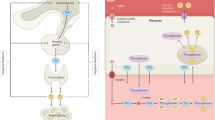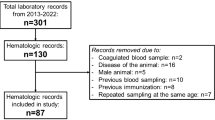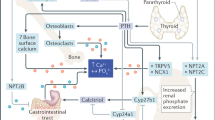Abstract
IT has already been reported (Harris and Moore, Biochem. Jour., 23, 261; 1929) that hypervitaminosis D always involved an atrophy, indeed eventually virtual disappearance, of the thymus, and similar changes in other lymphadenoid tissue—a discovery which has since led us to the observation that an equally remarkable fall occurs in the lymphocyte count in the same circumstances, for example, down to a reduction of more than 90 per cent below the normal average range. The atrophy of the thymus might perhaps have been accounted for simply as a feature of the general inanition: a similar change is seen in vitamin B deficiency and sometimes in starvation: yet this explanation seemed unsatisfactory. Loss of weight, for example in vitamin A deficiency, does not always produce such an effect.
This is a preview of subscription content, access via your institution
Access options
Subscribe to this journal
Receive 51 print issues and online access
$199.00 per year
only $3.90 per issue
Buy this article
- Purchase on Springer Link
- Instant access to full article PDF
Prices may be subject to local taxes which are calculated during checkout
Similar content being viewed by others
Author information
Authors and Affiliations
Rights and permissions
About this article
Cite this article
HARRIS, L. An Apparent Rôle for the Thymus (in Calcium Metabolism). Nature 125, 346–347 (1930). https://doi.org/10.1038/125346b0
Issue Date:
DOI: https://doi.org/10.1038/125346b0
Comments
By submitting a comment you agree to abide by our Terms and Community Guidelines. If you find something abusive or that does not comply with our terms or guidelines please flag it as inappropriate.



